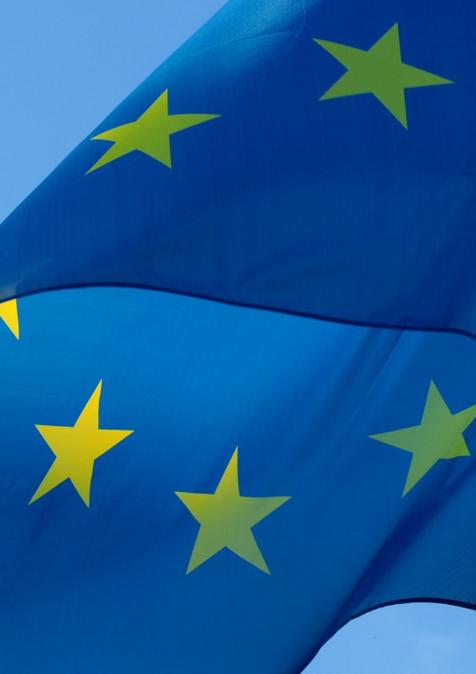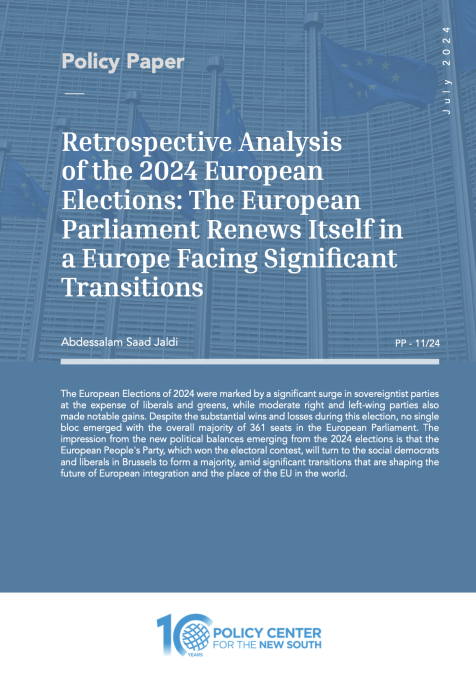Publications /
Opinion
A Sharp Right Turn
Hubert Vedrine is a foreign affairs veteran, named conseiller diplomatique to French President Francois Mitterrand at the age of 34, and subsequently appointed Secretary General of the Elysee’s Presidential Office, by the Socialist, managing his policies from the Elysée Palace in Paris. For five years, Vedrine served France as foreign minister, under the ‘cohabitation’ government (1997 to 2002), led by the conservative head of state, Jacques Chirac, and the Socialist prime minister Lionel Jospin.
In December 2023, at the 12th Atlantic Dialogues, organized by the Policy Center for the New South, Vedrine, for years President of the Institute Francois Mitterrand, joined me in AD talk. Our conversation did not touch on African challenges directly, but the continent was the subject when we analyzed the undeniable movement in Europe towards the political, even radical, right, which advocates for mass deportations of illegal migrants—thus numerous Africans.
Vedrine seemed not to be alarmed about menacing headlines predicting Europe’s invasion by populists. The politician and author of numerous political books, now 77, was not excessively concerned about inroads being made in Germany by the Alternative for Germany (AfD) party, which, according to some opinion polls, was surpassing the governing coalition parties, the SPD, FDP and the Greens. If tomorrow Germany would vote, I reminded Vedrine, more than 20% of the electorate would vote radical right, which tolerates openly fascist followers and does not hesitate to recruit members with racist slogans and radical solutions. Extremist right-wing militants, I suggested in our conversation, were reminding the world of the dark German history, Hitler, Holocaust and a dramatic war, reviving fear of a repeat global tragedy. Vedrine argued that many Europeans supporting the right are not necessarily extremists but are somehow “lost in globalization and bewildered by mass migration, much of it illegal”. He was though certain that “the right has not really any solutions either”.
Marching Steadily Into the Mainstream
Thus, a dark past is reappearing, believed to have been buried forever: authoritarianism and populism. A far-right takeover of Europe seems to be underway. “The far right is winning Europe’s immigration debate”, wrote Foreign Policy (November 1, 2023). “Mainstream parties across Europe are shifting their positions on immigration in hopes of impeding the rise of the far right,” observed Foreign Policy’s Anchal Vohra. European Union elections are approaching (in June 2024) and Europe correspondent Jon Henley explained in The Guardian (June 30, 2023) how “Europe’s far right is marching steadily into the mainstream, whether in Italy, Spain, France or Finland, parties that were once outcast are fast gaining respectability—and power”. Eddy Wax of Politico (February 6, 2024) dared to predict: “The next European Parliament looks more Pro-Russian and less green than the current one. Could a far right EU really happen?”
The European Council on Foreign Relations (January 23, 2024) predicted in its forecast for the 2024 European Parliament elections, titled “A sharp right turn”, that there will be “a major shift to the right in many countries”. Anti-European populists are likely to top the polls in nine member states (Austria, Belgium, Czechia, France, Hungary, Italy, the Netherlands, Poland, and Slovakia) and come second or third in another nine countries (Bulgaria, Estonia, Finland, Germany, Latvia, Portugal, Romania, Spain, and Sweden). The European Council on Foreign Relations predicted: “Inside the European Parliament, a popular right coalition of Christian Democrats, conservatives, and radical right MEPs could emerge with a majority for the first time. This sharp right turn is likely to have significant consequences for European level policies, which will affect the foreign policy choices that the EU can make, particularly on environmental issues, where the new majority is likely to oppose ambitious EU action to tackle climate change”. Hubert Vedrine suggested: “we need courage and time. We can deplore the movement to the right, but we can’t stop immigration overnight. It’s difficult to stop”.
“Rising migration across Europe, including the biggest surge of asylum seekers since the 2015/2016 migrant crisis”, observed the Wall Street Journal (November 25, 2023), “is fueling support for far right and anti-migration parties”, potentially reshaping European politics. Almost 25 years ago, when Joerg Haider’s far right populist Freedom Party won just under 27% of the vote and entered government in Austria, noted Jon Henley, “the shock waves reverberated around Europe. Diplomats visits were cancelled and punitive measures imposed. Not long after, when Jean Marie Le Pen of France’s National Front (now National Rally or RN), reached the national run off, the eventual winner, Jacques Chirac, refused even to debate with the far-right leader, so abhorrent—and abnormal—were his views”. Now, Henley pointed out, “across western Europe far-right parties are advancing, climbing steadily up the polls, shaping the policies of the mainstream right to reflect nativist and popular platforms, and occupying select ministerial roles in coalition governments”. In March, Portugal’s center-right leader Luis Montenegro’s Democratic Alliance won 80 of 230 seats in parliamentary elections. To assume the leadership as prime minister and head of a majority coalition government, the conservative pledged not to include the radical right Chega party in his government, which was founded only five years ago and won 50 seats (The Guardian, March 21, 2024).
“Every five years, like clockwork,” wrote Eddy Wax, “mainstream politicians freak out about the rise of radicals and populists ahead of the European election. But then, the danger suddenly seems to dissipate as the traditional center-left and center-right forces that built the European Union forge coalitions that hold more radical parties at bay”. But, Wax warned, “don’t bank on it this time. In 2024, the right-wing surge in the polls seems bigger and bolder, with one predicting the national right and far right could pick up nearly a quarter of seats in the European Parliament in June”. Even if the center right—currently tipped to come first in the elections—refuses to work with “ever more powerful firebrand fringe parties”, as Wax sees them, “there’s still a significant chance, the far right will, for the first time, be able to influence Europe’s policy agenda. That will enable it to threaten the EU’s sacred values on rule of law and human rights, and block or even overturn major green and climate laws”. Viktor Orban, right-wing prime minister of Hungary, already promised a crowd of cheering supporters in Budapest (BBC, March 15, 2024, Nick Thorpe) that Donald Trump would win the US Presidency in November, and right-wing parties would win the European Parliament elections: “We started this year alone, by the end of it we will be the majority of the world”.
A Sharp Right Turn
Hubert Vedrine is a foreign affairs veteran, named conseiller diplomatique to French President Francois Mitterrand at the age of 34, and subsequently appointed Secretary General of the Elysee’s Presidential Office, by the Socialist, managing his policies from the Elysée Palace in Paris. For five years, Vedrine served France as foreign minister, under the ‘cohabitation’ government (1997 to 2002), led by the conservative head of state, Jacques Chirac, and the Socialist prime minister Lionel Jospin.
In December 2023, at the 12th Atlantic Dialogues, organized by the Policy Center for the New South, Vedrine, for years President of the Institute Francois Mitterrand, joined me after his splendid public debate with André Azoulay, advisor to King Mohammed VI, in AD talk. Our conversation did not touch on African challenges directly, but the continent was the subject when we analyzed the undeniable movement in Europe towards the political, even radical, right, which advocates for mass deportations of illegal migrants—thus numerous Africans.
Vedrine seemed not to be alarmed about menacing headlines predicting Europe’s invasion by populists. The politician and author of numerous political books, now 77, was not excessively concerned about inroads being made in Germany by the Alternative for Germany (AfD) party, which, according to some opinion polls, was surpassing the governing coalition parties, the SPD, FDP and the Greens. If tomorrow Germany would vote, I reminded Vedrine, more than 20% of the electorate would vote radical right, which tolerates openly fascist followers and does not hesitate to recruit members with racist slogans and radical solutions. Extremist right-wing militants, I suggested in our conversation, were reminding the world of the dark German history, Hitler, Holocaust and a dramatic war, reviving fear of a repeat global tragedy. Vedrine argued that many Europeans supporting the right are not necessarily extremists but are somehow “lost in globalization and bewildered by mass migration, much of it illegal”. He was though certain that “the right has not really any solutions either”.
Marching Steadily Into the Mainstream
Thus, a dark past is reappearing, believed to have been buried forever: authoritarianism and populism. A far-right takeover of Europe seems to be underway. “The far right is winning Europe’s immigration debate”, wrote Foreign Policy (November 1, 2023). “Mainstream parties across Europe are shifting their positions on immigration in hopes of impeding the rise of the far right,” observed Foreign Policy’s Anchal Vohra. European Union elections are approaching (in June 2024) and Europe correspondent Jon Henley explained in The Guardian (June 30, 2023) how “Europe’s far right is marching steadily into the mainstream, whether in Italy, Spain, France or Finland, parties that were once outcast are fast gaining respectability—and power”. Eddy Wax of Politico (February 6, 2024) dared to predict: “The next European Parliament looks more Pro-Russian and less green than the current one. Could a far right EU really happen?”
The European Council on Foreign Relations (January 23, 2024) predicted in its forecast for the 2024 European Parliament elections, titled “A sharp right turn”, that there will be “a major shift to the right in many countries”. Anti-European populists are likely to top the polls in nine member states (Austria, Belgium, Czechia, France, Hungary, Italy, the Netherlands, Poland, and Slovakia) and come second or third in another nine countries (Bulgaria, Estonia, Finland, Germany, Latvia, Portugal, Romania, Spain, and Sweden). The European Council on Foreign Relations predicted: “Inside the European Parliament, a popular right coalition of Christian Democrats, conservatives, and radical right MEPs could emerge with a majority for the first time. This sharp right turn is likely to have significant consequences for European level policies, which will affect the foreign policy choices that the EU can make, particularly on environmental issues, where the new majority is likely to oppose ambitious EU action to tackle climate change”. Hubert Vedrine suggested: “we need courage and time. We can deplore the movement to the right, but we can’t stop immigration overnight. It’s difficult to stop”.
“Rising migration across Europe, including the biggest surge of asylum seekers since the 2015/2016 migrant crisis”, observed the Wall Street Journal (November 25, 2023), “is fueling support for far right and anti-migration parties”, potentially reshaping European politics. Almost 25 years ago, when Joerg Haider’s far right populist Freedom Party won just under 27% of the vote and entered government in Austria, noted Jon Henley, “the shock waves reverberated around Europe. Diplomats visits were cancelled and punitive measures imposed. Not long after, when Jean Marie Le Pen of France’s National Front (now National Rally or RN), reached the national run off, the eventual winner, Jacques Chirac, refused even to debate with the far-right leader, so abhorrent—and abnormal—were his views”. Now, Henley pointed out, “across western Europe far-right parties are advancing, climbing steadily up the polls, shaping the policies of the mainstream right to reflect nativist and popular platforms, and occupying select ministerial roles in coalition governments”. In March, Portugal’s center-right leader Luis Montenegro’s Democratic Alliance won 80 of 230 seats in parliamentary elections. To assume the leadership as prime minister and head of a majority coalition government, the conservative pledged not to include the radical right Chega party in his government, which was founded only five years ago and won 50 seats (The Guardian, March 21, 2024).
“Every five years, like clockwork,” wrote Eddy Wax, “mainstream politicians freak out about the rise of radicals and populists ahead of the European election. But then, the danger suddenly seems to dissipate as the traditional center-left and center-right forces that built the European Union forge coalitions that hold more radical parties at bay”. But, Wax warned, “don’t bank on it this time. In 2024, the right-wing surge in the polls seems bigger and bolder, with one predicting the national right and far right could pick up nearly a quarter of seats in the European Parliament in June”. Even if the center right—currently tipped to come first in the elections—refuses to work with “ever more powerful firebrand fringe parties”, as Wax sees them, “there’s still a significant chance, the far right will, for the first time, be able to influence Europe’s policy agenda. That will enable it to threaten the EU’s sacred values on rule of law and human rights, and block or even overturn major green and climate laws”. Viktor Orban, right-wing prime minister of Hungary, already promised a crowd of cheering supporters in Budapest (BBC, March 15, 2024, Nick Thorpe) that Donald Trump would win the US Presidency in November, and right-wing parties would win the European Parliament elections: “We started this year alone, by the end of it we will be the majority of the world”.









